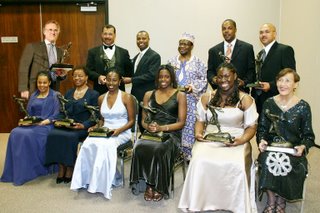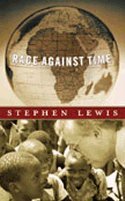If I was in Toronto right now, I imagine that I would be attending the International AIDS Conference.
Over the past week, I have gone on the net to read about some of the major updates. Before coming to Ghana, one of my primary responsibilities in Toronto was doing publicity for the 24th Annual Harry Jerome Awards. As part of my duties, I authored bios for all of the award recipients. One of those recipients was Stephen Lewis.

I decided to purchase the book he released in October 2005, “Race Against Time”. In it, a few of his speeches attempted to convey the impact that AIDS is having in Africa, many of the major factors that are feeding the problem, and the response of the international community to this crisis. The picture that he paints is candid and – while there are rays of hope – it is bleak.

I also want to add a small anecdote to this article. Last year, I was working with Canada Basketball doing communications. While working there I came across two very intriguing individuals: Tania and Jama who were working with Concrete Hoops. They were working on a project that had brought them to Swaziland to build basketball facilities and to conduct workshops on skill development.
 There are so many touching moments that they shared with me that were inspiring, but one aspect of what they faced was hard to digest. Tania, while in Swaziland, was focused on encouraging young woman to get involved in basketball. She saw confidence and self-determination – as well as remarkable empowerment – come with their participation in the program. While on a school bus going to a tournament, Tania sat with some of the girls talking. One of the things that came up was that some of the girls wrote Hip Hop lyrics. Too shy to recite the verses they had written, they, instead, allowed Tania to read their lyrics. It was a shock that had Tania numb when she saw that the words on the pages were preoccupied with death. She had expected lyrics about their clothes, boys they liked, and how nice their skills were, not the expectation of an early grave.
There are so many touching moments that they shared with me that were inspiring, but one aspect of what they faced was hard to digest. Tania, while in Swaziland, was focused on encouraging young woman to get involved in basketball. She saw confidence and self-determination – as well as remarkable empowerment – come with their participation in the program. While on a school bus going to a tournament, Tania sat with some of the girls talking. One of the things that came up was that some of the girls wrote Hip Hop lyrics. Too shy to recite the verses they had written, they, instead, allowed Tania to read their lyrics. It was a shock that had Tania numb when she saw that the words on the pages were preoccupied with death. She had expected lyrics about their clothes, boys they liked, and how nice their skills were, not the expectation of an early grave.Considering that an estimated one in three people in Swaziland are infected with HIV/ AIDS, such an awareness of human mortality at an age that tends to be veiled in the guise of eternal youth is logical.
Tania also told me that some people are very careless sexually, because the thinking is that it is inevitable. When one in three people around you is infected, that is not as insane as it might seem. And it is such realities that are hard to extract from the numbers and statistics.

In reading some of the major articles printed in the Toronto media on the issue, there are two things that stood out to me: the stigma attached to having AIDS, and the role of the media in combating this crisis. I actually see those subjects as being connected.
In Tamale, Ghana, there are a number of billboards that urge people to “show compassion” to those living with HIV / AIDS. I don’t think that this can happen through any more effective method than for people to see the issue and the victims of the virus as they see themselves.
In terms of how this happens, I am suggesting a focus on telling the stories of people affected. When we realize what it is like to grow up in a ‘child-headed household’ where the children have been orphaned by the disease, when we see the burden of grandmothers who have outlived their own children raising large numbers of grandchildren, or we hear the disturbing tint that the prevalence of untimely death can put on the usually radiant stage of one’s youth, we will care.
The media: radio, newspapers, magazine, television, novels, plays, and films can share these stories. When people are given the opportunity to feel these stories, they will care.
Can you imagine Stephen Harper skipping the International AIDS Conference if he had grown up an orphan to parents killed by the virus? Even if he had spent time in one of the communities across the world that have been ravaged by its deadly touch or had witnessed someone dear to him slowly lose the fight, would the issue be as far down his list of priorities as it seems to be?
I think when we share the stories we can connect people to the issue. My own path to awareness is a testament to this.
I can not name one person that I know who has the virus or who has even had someone close to them have the virus. I have never, knowingly, spoken to, shaken hands with, or hugged someone that I knew had HIV / AIDS. The closest it gets for me is Magic Johnson; however, the saavy public relations approach that his camp takes with his health and the availability of cutting edge treatment that his financial circumstance offers him actually makes it seem like it is not as serious as it really is.
Until the past year, HIV / AIDS has not been something that I really thought much about. Hearing Tania’s story of the book of lyrics written by a teenage girl in Swaziland made it personal for me. Reading the accounts that Stephen Lewis shared of the daily impact that this is having on people’s lives opened my eyes, and the irresponsibility of the international community added to this.
We really have to go out of your way and find the stories. It is a given that if family and friends close to us were dealing with the virus, or if it was a personal reality, we would care a lot more. While you might not know people that it is affecting, it is affecting people. That should be enough, and when we come in contact with the human stories, it usually is enough to care. A lot of things happen when a lot of people care about something.
No comments:
Post a Comment